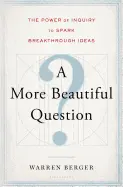
A More Beautiful Question - by Warren Berger
ISBN: 1620401452Date read: 2015-07-07
How strongly I recommend it: 3/10
(See my list of 430+ books, for more.)
Go to the Amazon page for details and reviews.
A fine book, but maybe because I've been around professional creatives instead of corporate-types for most of my life, I already knew this subject too well, so it wasn't very useful to me.
my notes
He took ownership of that question, Why can’t they make a better foot?
To replace they with I.
If you never actually do anything about a problem yourself, then you’re not really questioning—you’re complaining.
We think someone else will solve that problem. But there isn’t anyone else.
Good questioners tend to be comfortable with, their own ignorance.
I know more about my ignorance than you know about yours.
Ask, Now that we know what we now know, what’s possible now?
When it comes to questioning, companies are like people: They start out doing it, then gradually do it less and less.
As expertise loses its “shelf life,” it also loses some of its value.
Known answers are everywhere, and easily accessible.
The real value, is in what you can do with that knowledge.
The glut of knowledge makes us more ignorant.
As our collective knowledge grows, the amount that the individual knows, in relation to the growing body of knowledge, is smaller.
There’s more darkness into which we can shine that “question flashlight.”
(neoteny being a biological term that describes the retention of childlike attributes in adulthood).
A pattern in many of the stories:
• Person encounters a situation that is less than ideal; asks Why.
• Person begins to come up with ideas for possible improvements/solutions—with such ideas usually surfacing in the form of What If possibilities.
• Person takes one of those possibilities and tries to implement it or make it real; this mostly involves figuring out How.
The worst thing you can do with a difficult question is to try to answer it too quickly.
When we start teaching too much, too soon, says Gopnik, we’re inadvertently cutting off paths of inquiry and exploration that kids might otherwise pursue on their own.
If they are permitted to do that research—to raise and explore their own questions, through various forms of experimentation, and without being burdened with instructions—they exhibit signs of more creativity and curiosity.
Young kids learn in much the same way scientists do, by exploring and experimenting, and that we should beware of trends toward more structured and academic early-childhood programs. That academic rigor comes soon enough, as students begin grade school.
Preschool children, on average, ask their parents about 100 questions a day. By middle school, they’ve pretty much stopped asking.
What are schools for? (That question could also be phrased as Why are we sending kids to school in the first place?)
Should we abandon the failed experiment of teaching facts?
“Lower-income parents are not wrong,” she said. “They know that if their kids ask questions, they might get in trouble. They’re telling their children to be careful in school.” The middle-class kids are in a different situation, Meier notes. “They go to school feeling safe.” And because they feel safe, they can take the risk of raising their hands.
While other mothers asked their kids ‘Did you learn anything today?’ [my mother ] would say, ‘Izzy, did you ask a good question today?’
It’s not insignificant that Edwin Land was on vacation when the big Why question surfaced. He was removed from the day-to-day rush of his work. He had the time and the distance from practical business matters to entertain a question that was highly impractical.
Position myself relentlessly as an idiot: it’s a positive. Because being comfortable with not knowing—that’s the first part of being able to question.
In Iceland during the country’s financial meltdown, “I asked stupid questions like ‘Where’s the money?’ Because no one seemed to be able to give a straight answer to this basic question.
The value in asking naïve questions, Bennett says, is that it forces people to explain things simply. “If I just keep saying, ‘I don’t get it, can you tell me why once more?,’ it forces people to synthesize and simplify—to strip away the irrelevances and get to the core idea.”
In some parts of Asia, people sometimes welcome outsiders coming in and asking basic questions because they may be wondering about these things themselves—but they don’t want to ask because they can’t afford to look foolish or disrespectful.
In the beginner’s mind there are many possibilities, but in the expert’s there are few.